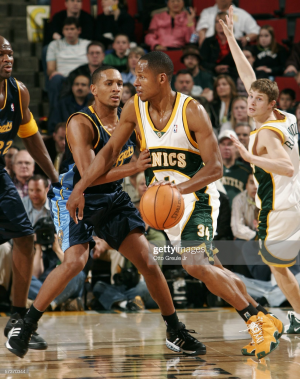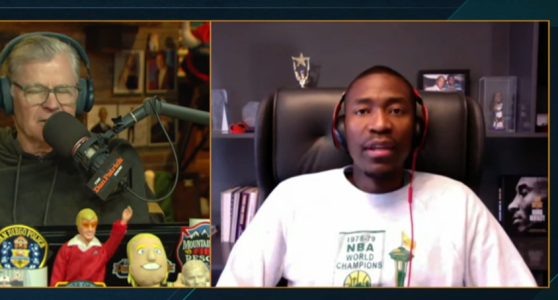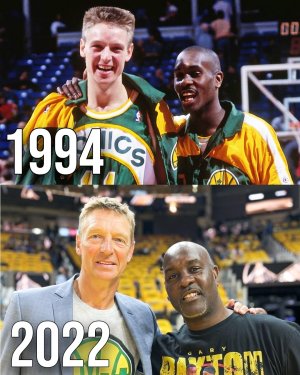Where will the Kings play next season? The NBA's heart says Sacramento, and its head says Seattle.
The wallet favors Seattle as well, following a decision late Friday by its potential ownership group to raise its overall bid to a league-record $550 million. Prior to kicking in the additional $25 million, the Seattle group already had an agreement with the Maloof family to buy 65 percent of the Kings.
The sentiment of maintaining the team's roots continues to benefit the potential ownership group in Sacramento. However, the dollars and facts that separate the two competing bids stand decidedly in favor of a move to the Pacific Northwest, according to a league source who attended Seattle's presentation to eight NBA owners last week in New York.
"We've never had a situation like this," said commissioner David Stern last week. Instead of calling for a vote on the future of the Kings at the board of governors meeting April 18-19, Stern warned of a delay on a final decision in order to give owners more time to analyze the choice between moving the team to Seattle and keeping it in Sacramento. The delay has created more time for Sacramento, which also presented its own plan to keep the Kings. Sacramento has been scrambling to assemble an ownership group and arena strategy that can compete with Seattle, which has been developing its plan for more than two years.
It is going to be a hard decision either way because something more than money is involved as Sacramento fights to keep its team. Seattle's fans understand the pain: Their Sonics were moved to Oklahoma City in 2008 because local government would not work with the NBA to build a new arena.
The passion of Seattle to regain what was lost was displayed throughout its presentation, in which the group, led by investor Chris Hansen -- and backed by Microsoft CEO Steve Ballmer -- emphasized the strengths of its bid while relentlessly pointing out the weaknesses of Sacramento's plan. The league source told SI.com that the main points on behalf of Seattle included:
• A franchise in Seattle would pay into the NBA's new revenue-sharing plan, while Sacramento would be receiving bailouts from revenue-sharing.
• The economy of Seattle is growing, while Sacramento's is shrinking -- and media rights for an NBA franchise in Seattle would be almost double the rights fees earned by Sacramento.
• A new arena in Sacramento cannot be built within three years, as proposed by Sacramento mayor Kevin Johnson. Based on an intrinsic set of checks-and-balances in California that have delayed local stadium projects by the Giants and 49ers, the Kings can expect to need at least six years to complete a new arena in Sacramento. The current site for a new arena in downtown Sacramento may not be viable.
The Seattle group laid out the recent history of arena building projects in the Sacramento region for NBA owners. The 49ers began their project to build a facility in Santa Clara, 88 miles from Sacramento, in August 2008; the new stadium is expected to open in 2014. The Giants launched their new stadium project 75 miles from Sacramento in April 1996, and it opened in 2000. The Warriors began work on a new arena in December 2012 with an anticipated opening in 2017.
Sacramento faces numerous issues in its attempt to complete its new arena project. The proposed downtown site involves at least 25 parcels of land that are controlled by five independent owners. Two previous attempts to plan an arena at the site have been abandoned because of high costs and other complications.
A 2004 Sacramento city cost estimate revealed that one million square feet would be demolished and more than 1,000 jobs would be displaced. ]The same report by the city valued the "hard costs" of building an arena downtown at $559 million. The current Sacramento plan prices the same work in 2013 at the same site at $345 million. In other words, according to the presentation made by Seattle, the Sacramento bid projects that the costs of land acquisition, demolition, infrastructure, construction and other overhead charges have fallen inexplicably by $214 million over the last nine years.
A 2005 Sacramento City Council report investigated the current downtown site and concluded: "This site has been previously studied and evaluated ... it offers exciting opportunities within a downtown setting yet has significant development issues. Due to its existing use as an urban shopping mall, this site is expensive to purchase and prepare for construction. Demolition and construction are difficult to complete without disruption to existing businesses. In addition, there are issues associated with historic structures. Staff believes that the costs associated with this site, as estimated by the consultant team, make it infeasible."
Sacramento's current plan calls for a new arena to open on this site in 2016.
No such issues exist for the Seattle site on the southern edge of downtown. The parcel is owned entirely by the group that is trying to buy the Kings. Hansen began working to purchase the land before his interest in building an NBA arena became public.
The economies of the two competing cities was another big part of Seattle's presentation to NBA owners. The online retailer Amazon is building a 3.3 million square-foot campus in Seattle that will serve as one of the country's largest corporate headquarters in a city location. As many as 17,000 young college-educated workers are expected to be hired by Amazon in Seattle, which could increase Seattle's annual GDP by more than 15 percent.
Hansen's group told NBA owners that Seattle has 13 companies rated in the Fortune 1000; Sacramento has none. The Seattle economy has been ranked among the top five in the U.S. for the last four years, according to the independent research firm POLICOM, while Sacramento has dropped from No. 19 in 2011 to No. 55 this year. The Seattle group told owners that Sacramento's fall has been structural rather than cyclical, based on Sacramento's emphasis on residential home construction leading up to the recent housing crisis. When the housing bubble burst, the Sacramento economy was hit hard. Seattle's 32,555 season-ticket requests at the time of the meeting last week was more than three times the number of pledges of Sacramento.
Seattle also questioned Sacramento's claim of being a one-sport market that would give all of its attention to the NBA. Seattle's presentation to NBA owners emphasized that six rival major sports franchises operate in the Bay Area with 90 miles of Sacramento. Five have their games broadcast in Sacramento -- and the 49ers, Raiders and Giants all drew larger TV ratings in Sacramento in 2012 than the Kings.
The 2008 departure of the Sonics has appeared to influence Stern's approach to the movement of franchises -- and therefore made it more difficult for Seattle to regain an NBA franchise. When the Hornets were in danger of being sold to an owner who might have moved the franchise out of New Orleans, Stern took the drastic step of using NBA money to buy the franchise. He was committed to keeping the team in New Orleans and sold the team for $338 million to Tom Benson, the local owner of the Saints, who next season will rebrand them as the Pelicans while entrenching the team in Louisiana.
"He can't have a second incident of helping a team leave a market," said an NBA owner of Stern. "Seattle was bad enough. And I'm sure he feels that Seattle had a chance to keep the team the first time around.
"The bottom line is that the incumbent always gets the last shot. You don't want teams moving around."
Stern's interim ownership of the Hornets resulted in one of the worst incidents of his career: the alleged "veto" of the trade that would have sent Hornets star Chris Paul to the Lakers. After enduring so much criticism on behalf of the Hornets and regarding the larger principle of keeping teams in their home markets -- a principle that surely improves the legacy of a retiring commissioner -- Stern has been consistent in giving the Kings one last chance to remain in Sacramento.
But Stern may not have the power to influence owners to see things as he sees them.
"I think their whole business plan is flawed -- that the real estate numbers don't work, that they don't have enough money to make any of it happen," the owner said of Sacramento group's proposal to buy the Kings and prevent them from moving to Seattle. "So from all I can tell right now, it fails.
"But," the owner added, "that could change if they brought in someone with big dollars."
The inherent problems of building an arena in Sacramento and the prosperity of the Seattle market may be crucial. It was, after all, the pursuit of revenues that prompted the NBA to lock out players two years ago -- and by awarding the franchise to Seattle, the NBA would be righting a wrong of five years ago.
It will be interesting to see whether the increased bid emphasizes the financial differences that separate the two groups and their competing cities. There was no demand for Seattle to up its price. Based on their binding agreement, the Maloofs could not ask for more money. At the same time, the expensive gesture shows that the Seattle partners would come to the NBA with deeper pockets than the recently-assembled group in Sacramento, which had yet to formally match the previous valuation of $525 million.
No matter how this plays out, the result will be bittersweet. One traditional NBA community will be spurned and angry. Each city brings enormous value to the league, and so the league must decide, sooner than later, where its best future lies -- in Sacramento or in Seattle? With the heart, or with the head?
Read More:
http://sportsillustrated.cnn.com/nb...kings-sale-david-stern-seattle/#ixzz2QMP0i2s2
















